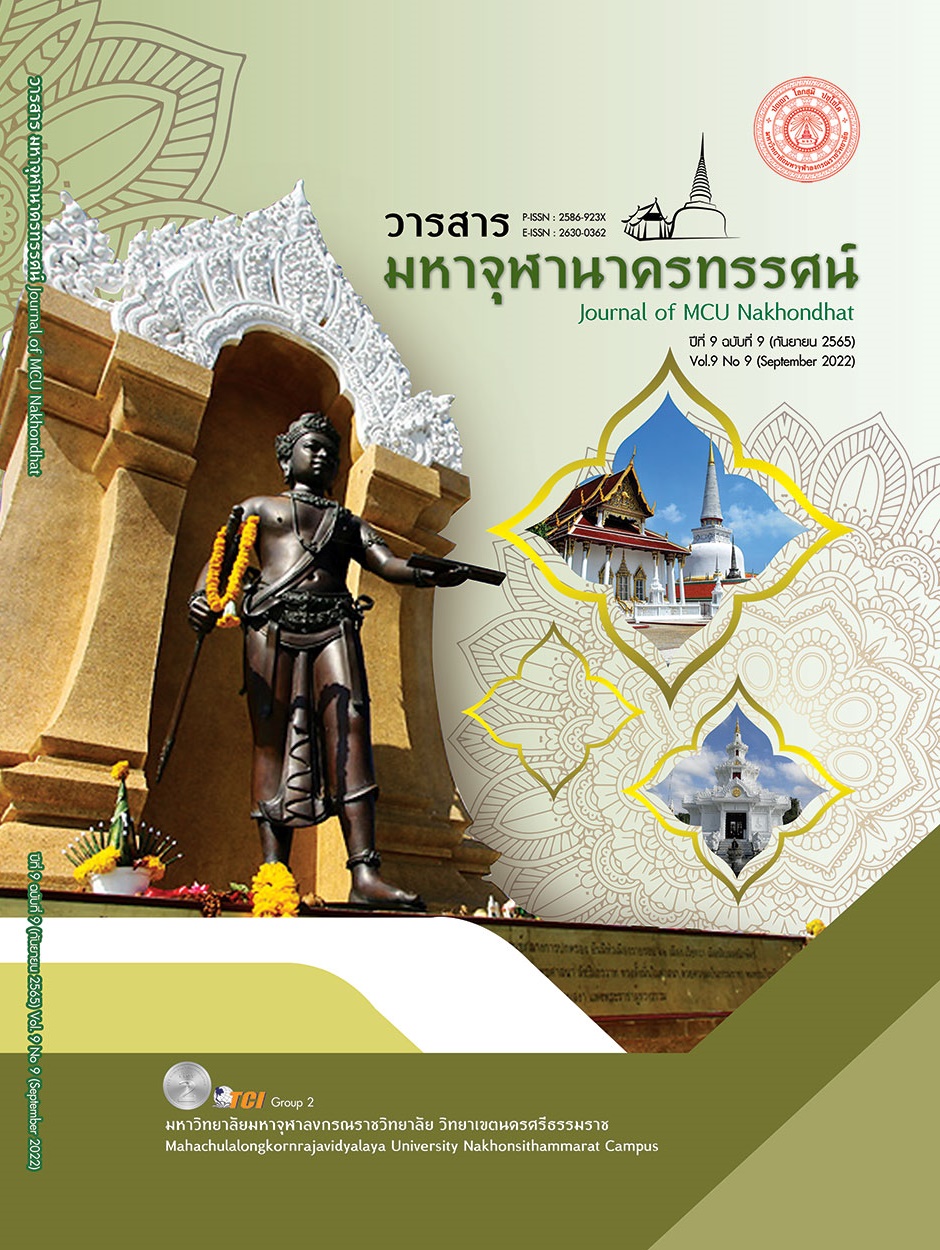THE FUTURE OF EDUCATION ADMINISTRATION ACCORDING TO THEPRINCIPLES OF BUDDHISM OF THE SANGHA COLLEGE OF KANCHANABURI SRIPAIBOON, KANCHANABURI PROVINCE
Main Article Content
Abstract
This academic article has a purpose to present The Future of Education Administration According to The Principles of Buddhism of The Sangha College of Kanchanaburi Sripaiboon, Kanchanaburi Province The authors researched from documents, textbooks, and journals on educational administration according to Buddhist principles. as well as removing the body of knowledge from the experience of teaching students in Kanchanaburi Sripaiboon Monastic College Mahachulalongkornrajavidyalaya University Kanchanaburi It was found that future studies study the potential of changing things that will make a difference in the future. It also gives importance to those involved at all levels of the organization. in order to determine the future together which the application of Buddhist principles in educational administration will be an alternative of the future and is a good guideline for improving the efficiency of the administration of the school administrators especially in the field of academic administration budget management personnel management general administration more effectively The Future of Education Administration According to The Principles of Buddhism of The Sangha College of Kanchanaburi Sripaiboon, Kanchanaburi Province It is a form that is related to the work of the school administrators. to achieve the goals set In almost every organization, modern management principles will focus on the technical model of the systemic management process which is a guideline for successful management according to the objectives which effectively corresponds to the changing trend in the current world context But if the administrators have adopted the principles of Buddhism, teachings of Buddhism come into the application together with modern management by conformity and integrated together in a balanced way It is considered a new management approach into a new dimension of management. "Happy people, complete work"
Article Details

This work is licensed under a Creative Commons Attribution-NonCommercial-NoDerivatives 4.0 International License.
References
ปาณจิตร สุกุมาลย์ และคณะ. (2561). อนาคตภาพมหาวิทยาลัยมหาจุฬาลงกรณราชวิทยาลัยในทศวรรษหน้า (พ.ศ2557 – 2566). วารสารบัณฑิตศึกษาปริทรรศน์, 14(1), 137-161.
ปารณีย์ เปยทา และคณะ. (2561). พุทธบูรณาการการบริหารสถานศึกษาสู่ องค์กรสมรรถนะสูง สำหรับสถานศึกษาสังกัดสำนักงานเขตพื้นที่การศึกษาประถมศึกษา. วารสารสันติศึกษาปริทรรศน์ มจร, 6(2), 669-682.
พระไตรปิฎกภาษาไทยฉบับมหาจุฬาลงกรณราชวิทยาลัย. (2535). หลักการบริหารการศึกษาตามหลักพุทธธรรม. กรุงเทพมหานคร: โรงพิมพ์มหาจุฬาลงกรณราชวิทยาลัย.
พระวิระพันธ์ ติกฺขปญฺโญ (เสียงเย็น). (2562). สถาบันอุดมศึกษาเพื่อการพัฒนาคนในยุค Thailand 4.0 เป็นขุมปัญญาของประเทศ. วารสารวิทยาลัยสงฆ์นครพนม, 3(3), 95-111.
มหาวิทยาลัยมหาจุฬาลงกรณราชวิทยาลัย. (2559). ประวัติและพัฒนาการมหาวิทยาลัยมหาจุฬาลงกรณราชวิทยาลัย. กรุงเทพมหานคร: บริษัท 21 เซ็นจูรี่ จำกัด.
เรณุมาศ มาอุ่น. (2559). การจัดการเรียนการสอนในระดับอุดมศึกษาอย่างมีประสิทธิภาพ. วารสารเทคโนโลยีภาคใต้, 9(2), 169-176.
วันเพ็ญ ศุภเสรีสกุล. (2564). การบริหารสถานศึกษาสู่ความเป็นเลิศตามหลักพรหมวิหาร 4 ของผู้บริหารโรงเรียนเอกชนใน อำเภอเมือง จังหวัดชลบุรี. เรียกใช้เมื่อ 22 พฤษภาคม 2565 จาก https://file:///C:/Users/user/Downloads/
วิกิพีเดีย สารานุกรมเสรี. (2565). มหาวิทยาลัยมหาจุฬาลงกรณราชวิทยาลัย. เรียกใช้เมื่อ 22 พฤษภาคม 2565 จาก https://th.wikipedia.org/wiki
สำนักงานสภานโยบายการอุดมศึกษา วิทยาศาสตร์ วิจัยและนวัตกรรมแห่งชาติ (สอวช.). (2564). บพค. เดินหน้าพัฒนากำลังคนและสถาบันความรู้ เผยปี 2563 - 2564 ผลงานได้ตามเป้า มั่นใจช่วยพัฒนากำลังคน นำไทยพ้นกับดักรายได้ปานกลาง สู่ประเทศรายได้สูง ในปี 2570. เรียกใช้เมื่อ 22 พฤษภาคม 2565 จาก https://www.nxpo.or.th/th/9559/
สิน งามประโคน. (2560). พุทธบริหารการศึกษา: แนวคิดทฤษฎีและการบูรณาการ. มหาวิทยาลัยมหาจุฬาลงกรณราชวิทยาลัย. วารสารนวัตกรรมการศึกษาและการวิจัย, 1(2), 103-116.
Web Programming1-54. (2552). หลักธรรมของนักบริหาร. เรียกใช้เมื่อ 22 พฤษภาคม 2565 จาก https://sites.google.com/site/webprogramming154/home/hlak-thrrm-khxng-nak-Brihar


